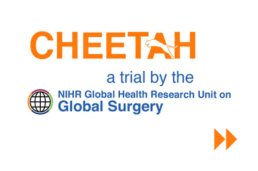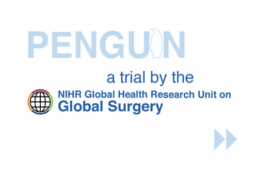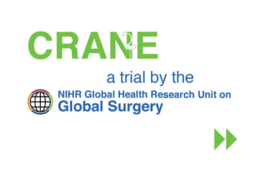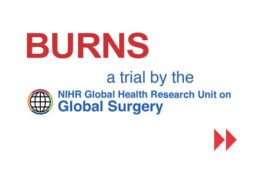The PROTECT-Surg Trial
The adaptive platform trial designed to assess interventions that will prevent complications from post-operative post-operative pneumonia.
Improving surgical outcomes through collaborative research


PROTECT-Surg is an adaptive platform design. Trial data will be reviewed on a regular basis to assess whether the the randomised comparisons in the study have provided evidence on postoperative pulmonary complications that is strong enough to influence global treatment guidelines.
Trial arms will be amended and new treatments that may show promise will also be considered on an ongoing basis and tested as part of the trial.
2
COUNTRIES
11
ACTIVE HOSPITALS
243
PATIENTS RECRUITED
Background
Surgical patients represent a highly vulnerable patient group, who are at particular risk of pneumonia during recovery from their operation.. They are vulnerable due to their underlying comorbidity, the physiological insult of an operation, and because they are subjected to invasive mechanical ventilation under anaesthesia. Whilst many non-urgent, non-cancer surgeries were delayed during the pandemic, many cancers, expedited and emergency surgeries continued to be performed. This patient risk continues into the post-pandemic era. Postoperative pneumonias are likely to create steep increases in mortality, morbidity, and resource use.
The PROTECT-Surg platform is designed to assess interventions that will prevent complications from post-operative pneumonia.
This trial seeks to investigate the prevention of perioperative pneumonia, an important and frequent surgical complication. This adaptive platform design seeks to identify at the earliest opportunity intervention arms which are showing benefit, drop arms which have a clear lack of benefit, and rapidly introduce new therapeutic options. This may include adoption of novel therapeutic agents or vaccinations as prophylaxis for surgical patients at risk of exposure.
An adaptive trial design will allow us to actively consider further trial interventions as they become available. These may be new therapies with early safety data. We are currently investigating, with other collaborators, candidate agents which are showing potential and will become available for testing on our platform. Due to the pace that this trial will progress, the control arm will remain the same throughout the duration of the study.
As diagnostic tests develop, this approach can also allow cohort enrichment and more accurate risk stratification once these diagnostic pathways are established; for example, to allow genetic stratification to target highest risk patients for specific treatments.
Aims & Objectives
Primary Objective
To provide reliable estimates of the effect of study treatments on postoperative pulmonary complications.
Secondary Objective
To assess the effects of study treatments on:
- Pulmonary function in keeping with WHO Solidarity Trial outcome scale
- Duration of intensive care and total hospital stay
- Safety and tolerability of study interventions
Surgical patients represent a highly vulnerable patient group, who are at particular risk of pneumonia during recovery from their operation.. They are vulnerable due to their underlying comorbidity, the physiological insult of an operation, and because they are subjected to invasive mechanical ventilation under anaesthesia. Whilst many non-urgent, non-cancer surgeries were delayed during the pandemic, many cancers, expedited and emergency surgeries continued to be performed. This patient risk continues into the post-pandemic era. Postoperative pneumonias are likely to create steep increases in mortality, morbidity, and resource use[2].
The PROTECT-Surg platform is designed to assess interventions that will prevent complications from post-operative pneumonia.
The aim of this study is to reduce pulmonary complications in patients undergoing abdominal or thoracic surgery in COVID-19 exposed hospital environments.
This trial has an adaptive platform design to identify at the earliest opportunity intervention arms which are showing benefit, drop arms which have a clear lack of benefit, and rapidly introduce new therapeutic options to the platform. This will enable rapid feedback of results to clinicians, allowing the standard of care to be modified as the pandemic progresses. Regular and frequent monitoring of results will be guided by an experienced, independent DMC.
Eligible patients will be randomised at the level of the individual in a 1:1 ratio between:
- Control (normal practice)
- RESP301 6ml mixture of 150mM sodium nitrate, 50mM mannitol and 100mM citric acid, buffered at pH 5.4, three times per day (at least 4 hours apart), for 7 days or until discharge, whichever occurs first
Patient Identification
Each participating hospital will decide how best to identify potentially eligible participants. Participant eligibility must be confirmed by an investigator prior to randomisation.
Recruitment – Consent
Researchers in each participating hospital, with advice from their research ethics committee(s), will decide how best to provide information to potential participants about the trial and seek informed consent (e.g. verbal or written informed consent, duration from receiving patient information sheet to participant providing informed consent, etc.). Patients should give separate consent for trial participation in addition to consent for the surgery itself; informed consent must be obtained prior to trial randomisation. Assumed consent in emergency settings is not possible because of the inhaled nature of the IMP.
Randomisation
Once informed consent for trial participation has been obtained, baseline data will be collected on the Randomisation Form. This should be completed by either the person taking consent or a member of the research team (e.g. nurse, clinical officer, medical officer).
Patients will be randomised on the day of surgery via a secure online randomisation system (available at: https://bctu-redcap.bham.ac.uk/). Patients will be randomised at a ratio of 1:1 and the online randomisation system will include a minimisation algorithm to ensure balance in the treatment. Minimisation variables are designed to be readily available and easy to determine:
• Site
• Age (<70 years versus 70+ years)
• Timing of surgery (elective versus emergency)
Treatment
Arm 1: Control (normal practice)
Treatment without the trial intervention. Patients will be treated as per hospital routine practice. The control arm may change over the course of the trial and will be monitored by the TMG and DMC.
Arm 2: RESP301
RESP301 is a formulation consisting of three agents already used in clinical practice: mannitol, sodium nitrite and citric acid. Delivered by a vibrating mesh nebuliser three times per day (TID) (at least 4 hours apart), for 7 days. Each dose of RESP301 is a 6ml admixture of 150mM NaNO2, 50mM mannitol and 100mM citric acid, buffered at pH 5.4.
RESP301 is administered quickly (8-10 minutes) via an easy-to-use, vibrating mesh nebuliser. The recommended nebulisers used to administer this intervention are available in all participating countries. The intervention will be administered using a nebuliser according to standard local practice; where permitted for patients to self-administer, a member of the clinical team will ensure that the patient has viewed the intervention administration training video, and will also oversee the patient for the first trial dose to ensure proper administration.
Hand-held vibrating mesh nebulisers with regulatory approval for use in each designated country will be used for this trial. Chosen products will meet specifications to ensure delivery of the intervention at the protocol-mandated dose. The details of each of the country specific nebulisers will be provided in a separate appendix.
Patients should undergo perioperative care according to each hospital’s normal practice, the main factors of which will be recorded. Potential interactions will be checked on a case by case basis. Discontinuation rates will be monitored.
Patients are eligible for the study if all of the following apply:
- Patients aged 18 years and over.
- Planned to undergo abdominal or thoracic elective or emergency inpatient surgery requiring general anaesthesia.
- Patient consent.
- Able to operate a vibrating mesh nebuliser, as assessed by the recruiting physician.
The eligibility criteria may change over time to reflect new diagnostic tests or changing epidemiology. This will be reviewed regularly by the TSC and DMC. For example, if routine serological screening before surgery becomes feasible during the course of the trial in any participating hospital, only seronegative patients may be eligible for the trial.
Co-enrolment into other interventional trials may be considered on a case-by-case basis, and must be agreed with the study CI prior to randomisation into PROTECT- Surg.
Patients are not eligible for the study if any of the following apply:
- Procedures under local anaesthesia
- Known history of adverse reaction/contraindication to trial drug.
- Pregnancy and/or lactating patients (including patients undergoing caesarean section).
- History of methaemoglobinaemia
- Patients receiving any type of prescribed nitric oxide-donating agents (e.g.Nitroprusside, Isosorbide dinitrate, Isosorbide mononitrate, Naproxcinod, Molsidomine and Linsidomine)
- Unable to tolerate use of a nebuliser.
Sponsor and central coordination (BCTU)
The University of Birmingham will act as the Sponsor in all collaborating countries. Birmingham Clinical Trials Unit (BCTU) is the International Coordinating Centre (ICC) for PROTECT-Surg.
BCTU is responsible for overall coordination of the trial, including, but not limited to: procuring requisite ethics and regulatory approvals; organising meetings of oversight committees (TMG, DMC, TSC); development of trial database, SOPs, trial-specific documentation and provision thereof to participating hospitals; monitoring and reporting trial progress and safety (including onward safety reporting) in line with applicable regulatory requirements.
Participating Hospital sites
At each hospital site, a Principal Investigator (PI) and their team will: obtain requisite regulatory and ethical permissions to run the trial; ensure all relevant staff have received mandatory trial training; respond to queries from participants, the public and BCTU; and conduct trial procedures in accordance with the protocol and local policy.
Trial Management Group (TMG)
The TMG includes those individuals responsible for the day-to-day management of the trial. This will include the trial CI, lead methodologists, statisticians and trial management staff. The role of the TMG is to monitor all aspects of the conduct and progress of the trial, ensure that the protocol is adhered to and take appropriate action to safeguard participants and the quality of the trial.
Data Monitoring Committee (DMC)
The DMC will operate in accordance with a trial-specific charter. The DMC will review unblinded interim analyses according to a schedule described in the aforementioned charter and make recommendations to the TSC regarding possible amendments to the protocol (for example, if any of the treatment arms may require discontinuation or adjustment, or in the event of any safety concerns).
Trial Steering Committee (TSC)
The TSC will provide overall supervision of the trial to ensure that it is being conducted in accordance with the principles of Good Clinical Practice and other relevant regulations. The TSC will operate in accordance with a trial-specific charter. The specific tasks of the TSC are:
- Review and approval of the trial protocol and amendments, new sub study proposals and publications
- Review trial progress (including review of emerging information that be of relevance to the trial, e.g. new studies, therapies, etc) and advise on issues raised by other oversight committees
- Review recommendations from the DMC and help with subsequent decision-making
Scientific Advisory Committee (SAC)
The SAC will provide expertise scientific guidance and advice on the strategic direction of the trial. The specific tasks of the SAC are to:
- Provide advice based predominantly on research evidence from the natural or social sciences
- Provide constructive feedback about the scientific direction of the trial and help with subsequent decision-making
- Sharing ideas, based on data and professional experience.
Central Trial Management Group (University of Birmingham)
PROTECTSurg Trial Team
Birmingham Clinical Trials Unit, Public Health Building
University of Birmingham, Edgbaston, B15 2TT
Email: PROTECT-Surg@trials.bham.ac.uk
Tel: from UK 0121 415 9103, International +44121 415 9103
Twitter: @ProtectSurg





